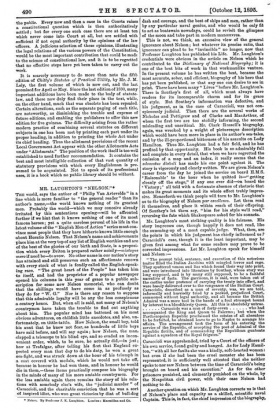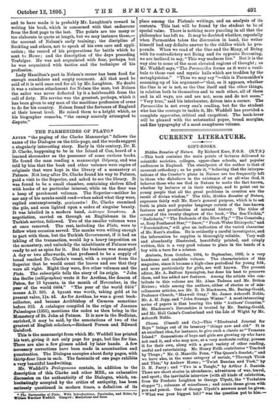MR. LAUGHTON'S " NEL SON."*
THE world, says the author of "Philip Van Artevelde " in a line which is more familiar to "the general reader" than its author's name,—the world knows nothing of its greatest men. Probably the world—which we may conceive already irritated by this sententious opening—will be affronted further if we hint that it knows nothing of one of its most famous heroes ; yet a quite careless perusal of his life in the latest volume of the " English Men of Action " series must con- vince most people that they have hitherto known little enough about Horatio Nelson. That Nelson's name and achievements place him at the very top of any list of English worthies and are of the best of the glories of our birth and State, is a proposi- tion which every Briton is prepared rather noisily—mixtogue inero if need be—to avow. No other name in our nation's story has attained and still preserves such an affectionate renown with every stock of what is fondly called the English-speak- ing race. " The great heart of the People" has taken him to itself, and had the proprietor of a popular newspaper opened his columns in this year of grace to a public sub- scription for some new Nelson memorial, who can doubt that the shillings would have come in as profusely as they do for " W. G." Nor is there any reason to suppose that this admirable loyalty will be any the less conspicuous a century hence. But, when all is said, not many of Nelson's countrymen have taken the trouble to find out anything about him. The popular mind has battened on his most obvious adventures, on childish little anecdotes, and also, un- fortunately, on tittle-tattle. How Nelson, the small boy, told his aunt that he knew not fear, as hundreds of little boys have said before, and will say again ; how Nelson, the man, clapped a telescope to his blind eye, and so evaded an incon- venient order, which, to be sure, he actually did,—in jest ; how at Trafalgar, after telling his fleet that England ex- pected every man that day to do his duty, he won a great sea-fight, and was struck down at the hour of his triumph in a coat covered with medals, which he would not take off, because in honour be had won them, and in honour he would die in them,—these items practically compose his biography in the minds of many of his more amiable countrymen. For the less amiable again there remains the story of his rela- tions with somebody else's wife, the "judicial murder " of Caraccioli, and the charitable conviction that he was a sort of inspired idiot, who won great victories by dint of bull-dog
• Nelson. By Profaisor J. R. Laughton. London: Macmillan and CO.
dash and courage, and the best of ships and men, rather than by any particular naval genius, and who would be only fit to act as boatswain nowadays, could he revisit the glimpses of the moon and take part in modern manceuvres.
This is not, we think, an excessive view of the general ignorance about Nelson ; but whatever its precise ratio, that ignorance can plead to be " invincible " no longer, now that Professor Laughton has published his Life. Mr. Laughton's credentials were obvious in the article on Nelson which he contributed to the Dictionary of National Biography; it is one of the best bits of work in that workmanlike venture. In the present volume he has written the best, because the most accurate, sober, and efficient, biography of his hero that has yet been published, or that any one can desire to see in print. There have been many " Lives " before Mr. Laughton's. There is Southey's first of all, which must always have readers for its incomparable charm and for its grace of style. But Southey's information was defective, and his judgment, as in the case of Caraccioli, was not con- spicuously judicial. Then there are the several works of Nicholas and Pettigrew and of Clarke and MacArthur, of whom the first two are too stolidly informing, the second misleading and uncritical. Mr. Clark 'Russell's biography, again, was wrecked by a weight of picturesque description which would have been more in place in its author's sea-tales, and by the ill-proportioned bitterness of his assaults on Lady Hamilton. Thus Mr. Laughton had a fair field, and he has profited by that opportunity. His book is so admirably full and complete in every detail, that when we have regretted the omission of a map and an index, it really seems that the advocates diaboli has made his one point against it. The story is vigorously and clearly written. We are given Nelson's career from the day he joined the service on board H.M.S. Raisonable ' to the hour when he quitted it—" getting cleanly off the stage," if any one ever did—on board the Victory ; ' all told with a fortunate absence of rhetoric that makes its great moments and its whole effect trebly impres- sive. Henceforth we think people will turn to Mr. Laughton's as to the biography of Nelson par excellence. Let them read it themselves, and place it within reach of their offspring. Of Southey's let them say, " him for his style we'll read," reversing the fate which Shakespeare asked for his sonnets.
Mr. Laughton's most striking quality is his fairness. His story impresses one, though happily it does not read, like the summing-up of a moat capable judge. What, then, are
the points in which his judgment has chiefly influenced us ? Caraccioli's case, though it is the least important, may be given first among what for some readers may prove to be
corrected impressions. Let Mr. Laughton speak for himself and Nelson:— "The prompt trial, sentence, and execution of this notorious traitor filled the Italian Jacobins with mingled terror and rage. They sputtered venom and lies which found their way into print, and were introduced into literature by Southey, whose story was long supposed, and is by many still supposed, to be a faithful narrative of facts. The garrisons, it is said, were taken out of the castles under pretence of carrying the treaty into effect, and were basely delivered over to the vengeance of the Sicilian Court. Caracciolo, described as a man of seventy, was, we are told, informally and hurriedly tried by a packed, prejudiced Court, summoned without legal authority, and all because the British Admiral was a mere tool in the hands of a foul strumpet bound by interest to a bloodthirsty Queen. All this is absolutely untrue.
Caracciolo was a man of forty-seven who had accompanied the King and Queen to Palermo ; but when the Parthenopeian Republic proclaimed the estates of all absentees to be forfeited, he obtained leave to go to Naples to arrange his affairs. The arrangement took the form of his entering the service of the Republic, of accepting the post of Admiral of the Republic flotilla, and of commanding the Republican gunboats against a squadron of the Royal frigates."
Caraccioli was apprehended, tried by a Court of the officers of his own service, found guilty and hanged. As for Lady Hamil-
ton, " with all her faults she was a kindly, soft-hearted woman; but even if she had been the cruel monster she has been represented, it is sufficiently well attested that she neither spoke to nor saw Nelson between the time of Caraccioli's being brought on board and his execution." As for the other prisoners punished, and clemently punished on the whole, by the Neapolitan civil power, with their case Nelson had nothing to do.
Another question on which Mr. Laughton corrects us is that of Nelson's place and capacity as a skilled, scientific naval Captain. This is, in fact, the chief impression of the biography,
and to have made it is probably Mr. Laughton's reward in writing his book, which is concerned with that endeavour from the first page to the last. The points are too many or too elaborate to quote at length, but we may instance these,— the account of Nelson's early training; the discipline of Suckling and others, not to speak of his own care and appli- cation; the record of his preparations for battle which he sent to Howe; and the description of the days preceding Trafalgar. He was not acquainted with fear, perhaps, but he was acquainted with tactics and the technique of his profession.
Lady Hamilton's part in Nelson's career has been food for enough scandalous and empty comment. All that need be said of it is said once and for all by Mr. Laughton. No doubt it was a ruinous attachment for Nelson the man, but Nelson the sailor was never deflected by it a hairbreadth from the call of duty. His service was the greatest, perhaps, which it has been given to any man of the maritime profession of arms to do for his country. Nelson found the fortunes of England at their lowest level. He raised them to a height which, as his biographer remarks, " the enemy scarcely attempted to dispute."



















































 Previous page
Previous page